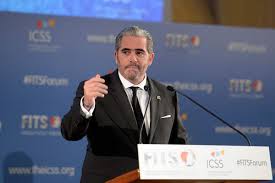By Paul Nicholson
April 22 – Emanuel Macedo de Medeiros, former European Leagues boss and head of global integrity group SIGA, has said the collapse of the European Super League proposal presents a “unique opportunity to redefine European football” and move away from the days of the ‘gun on the table’ negotiations of Europe’s super wealthy clubs.
Medeiros is well placed to comment on the latest move by the big clubs having sat at the negotiation table between clubs and UEFA from the fraught days of the original G14 clubs. But even he was stunned by the latest move by the world’s wealthiest club owners to carve out more of football’s money for themselves.
“UEFA and its president have been operating in the most dramatic crisis ever in world football. Clubs have never gone this far before, and they have done it unashamedly in a time of global crisis and financial recession. The clubs and their owners have shown their true nature,” said Medeiros.
What is at stake, he says, is not just the future of the Champions League but of UEFA itself. And while he recognises that some owners have been quick to apologise he is adamant that “this is not enough”.
“When I see reasons to justify the unjustifiable it cannot be accepted. The days when negotiations were held with a gun on the table and with UEFA backed up against a wall and everyone knifing each other in the back as UEFA was forced to make concessions every four year, those days are gone.”
Medeiros makes the point that while the highest tier of the European game needs to face reform, the real opportunity to “address overdue reforms throughout the game that belongs to every fan, to every group, to all stakeholders.”
This will involve embracing concepts like independent scrutiny and oversight – concepts football talks about but generally keeps at arm’s length.
Medeiros praises UEFA president for taking the fight back to the wealthy ownerships and for making it aggressive and personal, something he believes had to happen if football was to maintain its values of solidarity and meritocracy.
A full interview with de Medeiros and the challenges facing football’s reform will be published tomorrow in Insideworldfootball.
Contact the writer of this story at moc.l1713962740labto1713962740ofdlr1713962740owedi1713962740sni@n1713962740osloh1713962740cin.l1713962740uap1713962740

